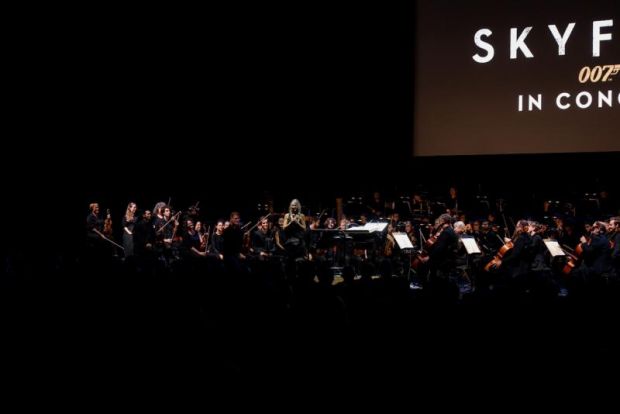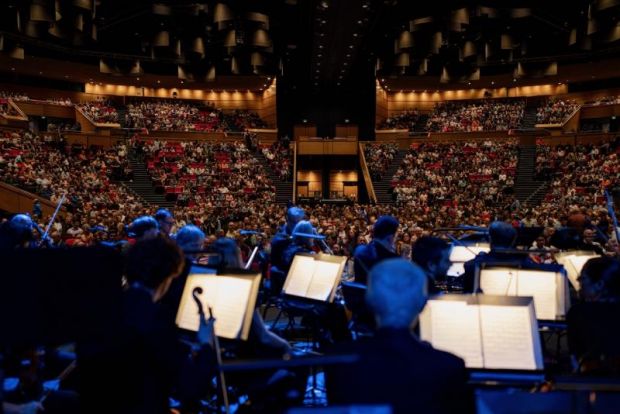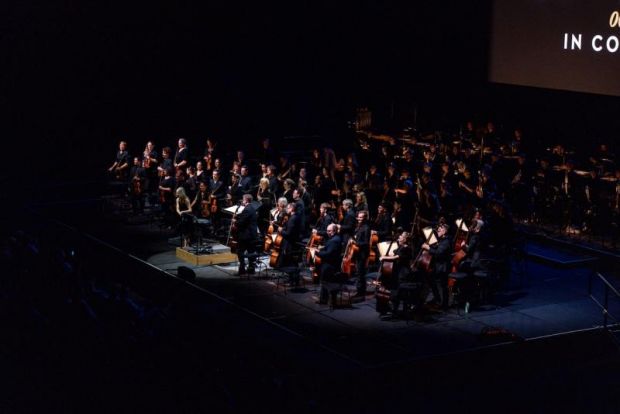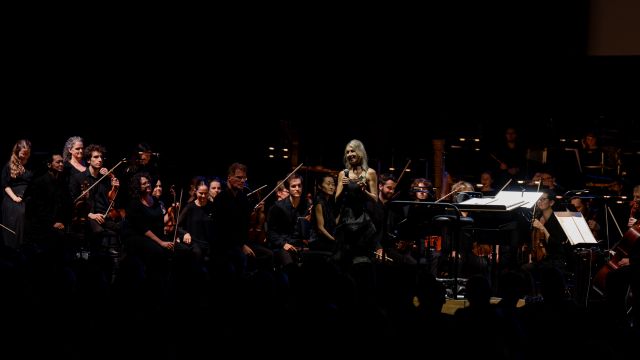Skyfall and Harry Potter and The Deathly Hallows Part 2 in concert
Experiencing a behind-the-scenes look at the workings of the film industry can sometimes be just as fascinating as watching the final result. If you've seen the movie (and not read the book) why not view it from a different perspective: through the eyes of a composer, indeed quite a different dimension and well worth exploring. And if you've ever tried turning the audio off during a movie you'll soon discover just how important the musical score is, not only enhancing the on-screen action but demonstrating how most movies just don't work without it.
On the showing of Skyfall in such an expansive venue including effective sound and lighting, I was also lucky to be seated facing the orchestra from the side perpendicular to the performance area, therefore able to view the concert with a focus on the conductor and orchestra at work. With an enticing entrance by conductor Vanessa Scammell, who also has all the trimmings of a Bond-Girl, the stage and mood was soon set for a night of non-stop thrills enhanced by the very effective score from renowned film composer Thomas Newman. The Newman family stem from a long-line of successful musicians, primarily set by Alfred Newman, Thomas's father, who was a prolific and in-demand film composer in the great years of Hollywood, particularly during the 1940's and 50's. His talent is well passed on with this driving, often percussive score intertwined with the brilliant, unique and unforgettable Bond themes composed in the 1960's by Monty Norman.

In addition to concert works, there is a vast amount of creative toil and trouble involved in syncing the music to the final edit (I know this because I have done it, even to the point where the director decided to edit some scenes down or out, which meant me having to re-write some of the score) but with the advent of computer programs the process has become more simplified and easier to manage. This is apparent with cinescore-concerts where the conductor has a metronomic screen to work to. However, one beat out from the orchestra and chaos could ensue and this is where Vanessa Scammell had really done her homework, being spot on with all the entrances both on-screen and with the musicians whilst capturing the musical nuances with almost balletic grace and guidance to an orchestra needing to concentrate on bar-counting, often poised ready for sudden tempo changes and mood. This can be a more demanding role in contrast to the ebb and flow of works written specifically for the concert platform. From my years of intuitive musical experience in the entertainment industry and apart from the absence of the distinctive guitar sound (sorely missed!) in the concert version of the Bond theme played in full as a tribute after the film had ended, I couldn't fault any section of the orchestra in the performances, another indication of the professionalism our talented orchestra has attained, being now world standard and able to perform a full score for a movie in one take. The producers in this instance would have no doubt been delighted!

Next on the program, the following evening and complete with a performance of great 'wizardry' from a group of actors and dancers in the entrance foyer, the final episode of the 'Harry-Potter-Institute-of-Marathon-Movies', The Deathly Hallows part 2, was brought to light, much to the delight of the ebullient audience, cheering on the Hogwart teams after a verbal introduction from the conductor who was again in full flood and control of the orchestra. This score, composed by another stalwart of the film industry, Alexandre Desplat, incorporating themes originally composed by the ever-popular John Williams, would have been a marathon task to fulfil, pacing through non-stop action, tempo and phrasing twists and turns and placing heavy demands on the conductor and powers of the orchestra. Unfortunately, most of the movie is shot in rather dark settings so it was difficult to see a hefty portion of the action due to the lighting required by the orchestra. However, with the dialogue on display, it was rather like reading the book with an orchestral accompaniment which again enhanced the musical score, bringing it to the forefront and creating a true concert experience.

I've always had a strong attraction to movie scores, in particular some of the most entrancing themes written over the years, not so in fashion these times, so I felt it was a night well worth the visit to reinvent the movies on show as a live concert experience, even to roam down roads I've been down before, this time with a new set of 'glasses' on; also to experience the pleasure and passion stemming from all those myriads of individuals, from oboist to set construction carpenter, all who have worked on a movie and thereby being able to relive certain memories at the touch of a button. If only the early inventors of this remarkable genre had realized what they had stumbled upon and how well it has evolved ...
Brian Adamson
Photographer: Sam Muller
Subscribe to our E-Newsletter, buy our latest print edition or find a Performing Arts book at Book Nook.

